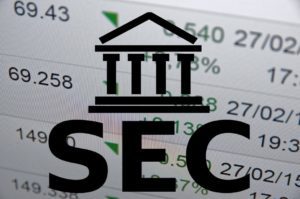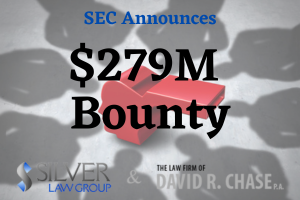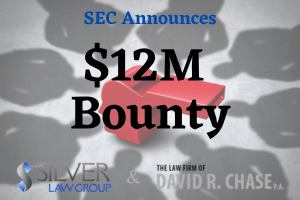 A “blank check company,” more formally known as a special purpose acquisition company (SPAC), was virtually unheard of ten years ago. However, as fewer companies have been able to launch initial public offerings (IPOs) on their own, SPACs skyrocketed in popularity. By 2020, half of all IPOs were tied to a SPAC, and the largest of these included billion-dollar deals. But the rise of SPACs has led to their abuse—taking advantage of investors—and a resulting crackdown by the Securities and Exchange Commission (SEC). Continue reading
A “blank check company,” more formally known as a special purpose acquisition company (SPAC), was virtually unheard of ten years ago. However, as fewer companies have been able to launch initial public offerings (IPOs) on their own, SPACs skyrocketed in popularity. By 2020, half of all IPOs were tied to a SPAC, and the largest of these included billion-dollar deals. But the rise of SPACs has led to their abuse—taking advantage of investors—and a resulting crackdown by the Securities and Exchange Commission (SEC). Continue reading
Articles Posted in SEC Whistleblower
The SEC Whistleblower Program Relies On Company Insiders—And Insiders May Receive A Reward
 Congress passed the Dodd-Frank Act on July 21, 2010, in response to the SEC’s failure to identify several Ponzi schemes and other securities fraud that had bilked investors out of billions of dollars and adversely affected the U.S. economy. The Act included provisions to protect whistleblowers who report securities law violations to the Securities and Exchange Commission (SEC) and provided incentives for SEC whistleblowers to come forward. Continue reading
Congress passed the Dodd-Frank Act on July 21, 2010, in response to the SEC’s failure to identify several Ponzi schemes and other securities fraud that had bilked investors out of billions of dollars and adversely affected the U.S. economy. The Act included provisions to protect whistleblowers who report securities law violations to the Securities and Exchange Commission (SEC) and provided incentives for SEC whistleblowers to come forward. Continue reading
The SEC’s New Focus On ESGs
 The Securities and Exchange Commission (SEC) has explained that “as investor demand for climate and other environmental, social, and governance (ESG) information soars, the SEC is responding with an all-agency approach” that reflects the risks and opportunities of ESG and climate investing. The agency is putting its policies into practice this year, and investigations are leading to increased enforcement. Continue reading
The Securities and Exchange Commission (SEC) has explained that “as investor demand for climate and other environmental, social, and governance (ESG) information soars, the SEC is responding with an all-agency approach” that reflects the risks and opportunities of ESG and climate investing. The agency is putting its policies into practice this year, and investigations are leading to increased enforcement. Continue reading
SEC Whistleblower Filings Are Confidential And Non-Reportable
 The SEC’s recent press release about streaming company Gaia’s activities focuses on both securities violations and whistleblower retaliation. The company terminated one employee for reporting lower subscriber rates both internally and to the SEC. Continue reading
The SEC’s recent press release about streaming company Gaia’s activities focuses on both securities violations and whistleblower retaliation. The company terminated one employee for reporting lower subscriber rates both internally and to the SEC. Continue reading
SEC Awards Whistleblower $279M Bounty—The Largest In Its History
 The SEC announced an award of $279 million to an individual for substantial assistance in an enforcement action. It’s the largest award in the history of the SEC’s Whistleblower program. The previous record for an award was made in October of 2020, when a whistleblower received $114 million. Continue reading
The SEC announced an award of $279 million to an individual for substantial assistance in an enforcement action. It’s the largest award in the history of the SEC’s Whistleblower program. The previous record for an award was made in October of 2020, when a whistleblower received $114 million. Continue reading
Two Whistleblowers Receive SEC Bounty of $12M
 In a recent press release, the SEC announced the award of $12 million to two whistleblowers who assisted in an enforcement action against a registered broker-dealer involved in wrongdoing.
In a recent press release, the SEC announced the award of $12 million to two whistleblowers who assisted in an enforcement action against a registered broker-dealer involved in wrongdoing.
The first whistleblower received a $9 million bounty after providing a tip that led to the SEC’s investigation. Without this information, the activity at the firm would have been “difficult to detect.” This whistleblower continued to provide information and assistance during the investigation. This included the identification of witnesses and “helping staff understand complex fact patterns and issues related to the matters under investigation.” Continue reading
Scott Silver And David Chase Are Guests Again On ‘Cut To The Chase’ Legal Podcast
 Following their 2021 appearance, SEC whistleblower attorneys Scott Silver and David Chase were invited back to the ‘Cut To The Chase’ legal podcast to discuss SEC whistleblower program updates and the relevance of the program in recent news, including the collapse of FTX.
Following their 2021 appearance, SEC whistleblower attorneys Scott Silver and David Chase were invited back to the ‘Cut To The Chase’ legal podcast to discuss SEC whistleblower program updates and the relevance of the program in recent news, including the collapse of FTX.
SEC Chairman Discusses $1BN In Whistleblower Bounties
The US Securities and Exchange Commission’s Whistleblower Program passed the $1 billion mark of awards in September of 2021. To mark the occasion, SEC Chair Gary Gensler discussed the significance of this milestone in an official SEC YouTube video. At the time, the SEC had paid out bounties of $1,074,010,519.76 to 207 individuals for their information and assistance. (The latest press releases have not indicated the number of whistleblowers who have been awarded bounties.) Continue reading
passed the $1 billion mark of awards in September of 2021. To mark the occasion, SEC Chair Gary Gensler discussed the significance of this milestone in an official SEC YouTube video. At the time, the SEC had paid out bounties of $1,074,010,519.76 to 207 individuals for their information and assistance. (The latest press releases have not indicated the number of whistleblowers who have been awarded bounties.) Continue reading
Joint Whistleblowers Collect $28 Million Bounty from SEC Enforcement Action
 The SEC recently announced that it has awarded a bounty of more than $28 million to “joint whistleblowers” who offered information and assisted in a successful enforcement action. The order indicated that there were four individuals, who will each receive 25% of the total, or roughly $7 million each. Continue reading
The SEC recently announced that it has awarded a bounty of more than $28 million to “joint whistleblowers” who offered information and assisted in a successful enforcement action. The order indicated that there were four individuals, who will each receive 25% of the total, or roughly $7 million each. Continue reading
Three SEC Whistleblowers Share $18 Million Bounty From SEC
 After another successful enforcement action, the SEC has awarded $18 million to three whistleblowers who each contributed vital information.
After another successful enforcement action, the SEC has awarded $18 million to three whistleblowers who each contributed vital information.
SEC whistleblower #1 alerted the SEC that the entity was engaging in fraudulent activity. They offered valuable information that led to the SEC’s investigation into a “fraudulent scheme.” Additionally, they provided the SEC staff with documentation and ongoing assistance throughout the investigation. The information gave SEC staff a substantial advantage that furthered the investigation and led to the success of the enforcement action. Continue reading
 SEC Whistleblower Lawyer Blog
SEC Whistleblower Lawyer Blog

